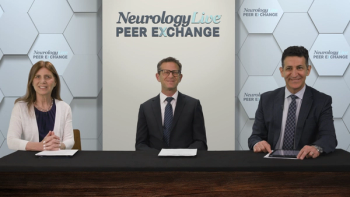
Sharon Cohen, MD, and Marwan Sabbagh, MD, differentiate between the preclinical, prodromal, and dementia stages of Alzheimer's disease (AD), and highlight known risk factors, including the contribution of ApoE gene polymorphism and copy numbers.

Sharon Cohen, MD, and Marwan Sabbagh, MD, differentiate between the preclinical, prodromal, and dementia stages of Alzheimer's disease (AD), and highlight known risk factors, including the contribution of ApoE gene polymorphism and copy numbers.

Key opinion leaders emphasize the significance of early diagnosis in Alzheimer's disease, as it allows patients to make autonomous decisions and access early treatment options, including potential participation in clinical trials.

The panel provides an overview of amyloid precursor protein (APP) and the generation of amyloid β (Aβ) peptides, Aβ42 and Aβ40, while also discussing which soluble or insoluble Aβ species (monomers, oligomers, protofibrils, or amyloid plaques) contribute to neuronal damage and the clinical manifestation of Alzheimer's disease.

Panelists delve into the amyloid cascade hypothesis of Alzheimer's disease and the ongoing debate surrounding it, discussing the presence and potential roles of Aβ monomers, oligomers, protofibrils, and amyloid plaques in patients with Alzheimer's disease.

Sharon Cohen, MD, and Marwan Sabbagh, MD, discuss the current understanding of tau as a marker of neuronal injury and its role in the pathophysiology of Alzheimer's disease, particularly focusing on the significance of phosphorylated tau and neurofibrillary tangles in the disease process.

Key opinion leaders emphasize the importance of neuroimaging in Alzheimer's disease, as it can rule out different diseases and diagnose microbleeds, while also discussing which biomarkers, histopathological features, and imaging characteristics are associated with different stages of the disease, exploring whether these tools can provide insights into the true onset of Alzheimer's disease.

Panelists review the use of CSF and blood-based biomarkers in Alzheimer's disease, discussing the role of tau as a marker of neuronal injury and its utility in staging the progression of Alzheimer's disease.

Medical experts discuss the application of ApoE gene polymorphism and copy number data in managing Alzheimer's disease, highlighting its relevance for individuals with a family history of AD, and symptomatic patients.

Key opinion leaders discuss the Alzheimer's disease pipeline and the numerous disease-modifying therapies under investigation.

Sharon Cohen, MD, and Marwan Sabbagh, MD, share their final thoughts on Alzheimer's disease and offer advice on strategies to reduce the risk of developing AD and slow the progression of the disease for those already affected.